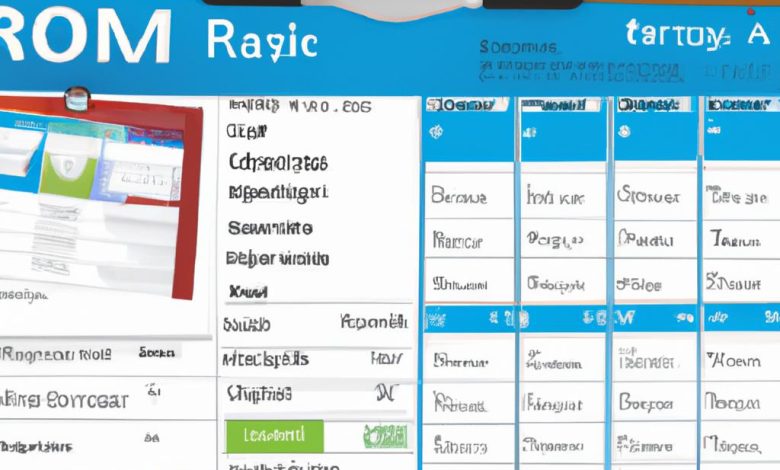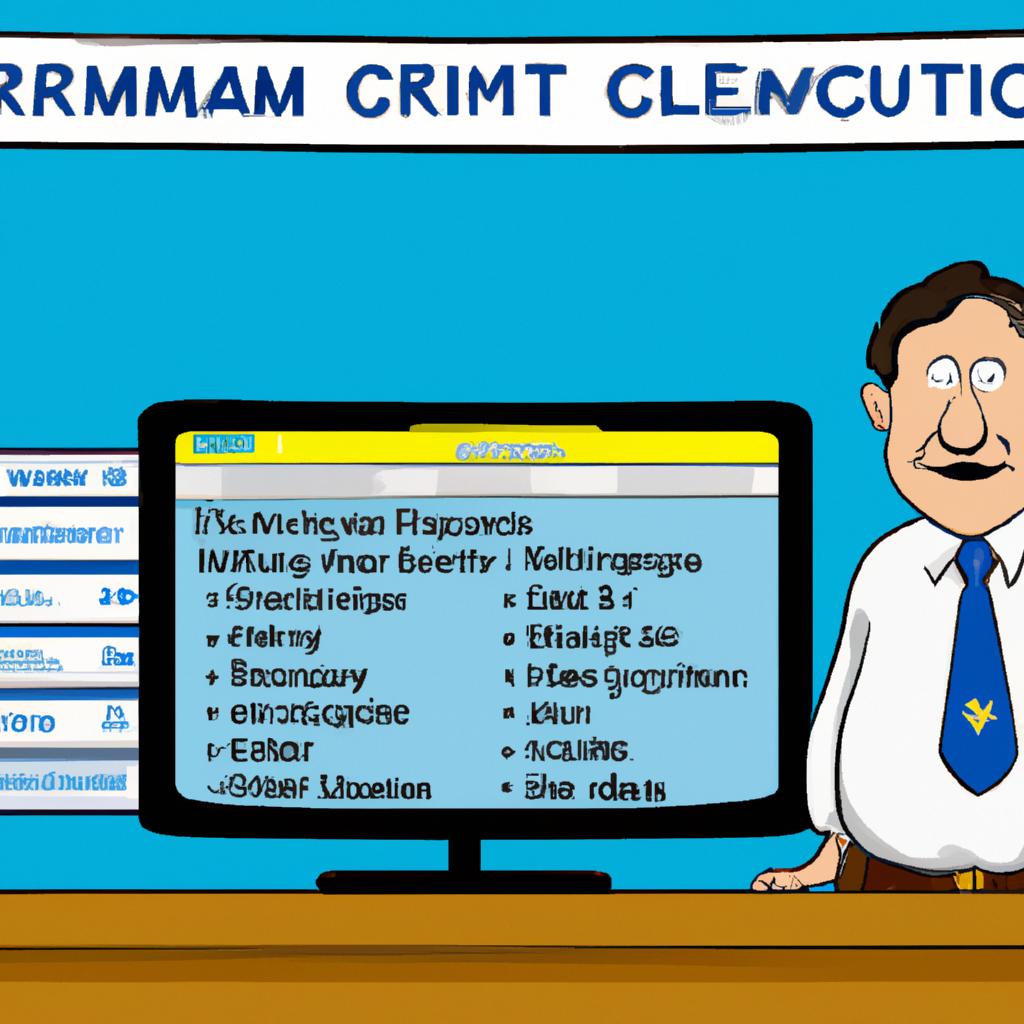CRM Software for Wholesale Distributors: Revolutionizing Efficiency and Growth

In today’s fast-paced wholesale distribution industry, staying ahead of the competition is crucial. The key to success lies in effectively managing customer relationships, streamlining operations, and optimizing sales processes. That’s where crm software for wholesale distributors comes into play. With its advanced features and tailored functionalities, CRM software has become an indispensable tool for businesses striving to achieve efficient operations and sustainable growth.
A. Definition and importance of CRM software for wholesale distributors

CRM, short for Customer Relationship Management, refers to a software solution designed to streamline and enhance customer interactions, sales, and marketing efforts. Specifically tailored to the needs of wholesale distributors, CRM software provides a comprehensive platform to manage customer data, track orders, and streamline inventory management.
With the rising complexity of wholesale distribution operations, the importance of CRM software cannot be overstated. It empowers businesses to centralize customer information, enabling efficient communication and personalized customer experiences. Additionally, CRM software facilitates accurate sales forecasting, identifies upselling and cross-selling opportunities, and automates repetitive tasks, ultimately boosting productivity and revenue.
B. Overview of the benefits of using CRM software in wholesale distribution

Implementing CRM software in wholesale distribution operations brings a plethora of benefits. Firstly, it enables businesses to gain a 360-degree view of customers, consolidating all relevant information into a single platform. This holistic approach allows for personalized communication, better understanding of customer needs, and ultimately, improved customer satisfaction.
Furthermore, CRM software enhances efficiency by automating manual tasks, such as generating sales reports, tracking orders, and managing inventory. By eliminating time-consuming administrative work, employees can focus on more valuable activities, such as building relationships with customers and identifying growth opportunities.
Moreover, CRM software provides valuable insights through analytics and reporting functionalities. Businesses can analyze sales patterns, customer behaviors, and market trends, empowering them to make informed decisions and devise effective sales and marketing strategies.
In the fiercely competitive wholesale distribution landscape, CRM software has become a game-changer. It allows businesses to efficiently manage customer relationships, optimize operations, and drive growth. By leveraging the power of CRM software, wholesale distributors can unlock their true potential and gain a competitive edge in the market.
Stay tuned for the upcoming sections, where we will delve deeper into the unique challenges faced by wholesale distributors and explore how CRM software addresses these challenges.
Understanding the Needs of Wholesale Distributors
A. Unique challenges faced by wholesale distributors
Wholesale distributors operate in a dynamic and competitive market, facing various challenges that set them apart from other industries. One of the primary challenges is managing a large volume of inventory while ensuring optimal stock levels. Wholesale distributors deal with numerous products and often have to handle complex supply chains, making inventory management a daunting task. Additionally, they must navigate through the intricacies of pricing, discounts, and promotions to remain competitive in the market.
Another significant challenge is maintaining strong customer relationships. Wholesale distributors often have a broad customer base, comprising retailers, manufacturers, and other businesses. Building and nurturing relationships with these customers require effective communication, personalized experiences, and timely responses to their needs. Without a centralized system to manage customer interactions, it becomes challenging to keep track of customer preferences, order history, and specific requirements.
B. How CRM software can address these challenges
CRM software offers a comprehensive solution to tackle the unique challenges faced by wholesale distributors. By implementing CRM software, businesses gain access to robust inventory management tools, allowing them to track stock levels, streamline ordering processes, and optimize warehouse operations. With real-time visibility into inventory data, wholesale distributors can make informed decisions regarding procurement, reducing stockouts and minimizing excess inventory.
Moreover, CRM software empowers wholesale distributors to build and maintain strong customer relationships. By centralizing customer information, CRM software provides a holistic view of each customer, including their preferences, purchasing history, and communication records. This enables sales representatives to provide personalized recommendations, offer targeted promotions, and deliver exceptional customer service. With CRM software, wholesale distributors can foster long-term loyalty and trust, contributing to repeat business and customer retention.
Furthermore, CRM software enhances collaboration and communication within the organization. Sales teams can share customer-related information, ensuring a seamless handover of accounts and avoiding duplication of efforts. With a centralized system, employees from different departments can access real-time data, enabling cross-functional collaboration and better decision-making.
In summary, CRM software addresses the unique challenges faced by wholesale distributors by providing efficient inventory management, personalized customer experiences, and improved internal collaboration. By leveraging the power of CRM software, wholesale distributors can overcome these challenges and achieve sustainable growth in a competitive market.
Stay tuned for the next section, where we will explore the key features and functionality of CRM software for wholesale distributors.
Key Features and Functionality of CRM Software for Wholesale Distributors
When it comes to CRM software for wholesale distributors, it is essential to understand the key features and functionalities that make it a valuable investment. Let’s explore the core capabilities that differentiate CRM software in this industry:
A. Inventory management and tracking
Efficiently managing inventory is crucial for wholesale distributors. CRM software offers robust inventory management features, allowing businesses to track stock levels, monitor product availability, and automate reordering processes. With real-time visibility into inventory data, distributors can ensure timely fulfillment of orders, prevent stockouts, and optimize warehouse operations.
B. Order and sales tracking
CRM software streamlines the order and sales tracking process, enabling distributors to manage the entire sales cycle efficiently. From capturing leads to processing orders and tracking shipments, CRM software provides a centralized platform to monitor sales activities. This functionality ensures accurate order management, minimizes errors, and enhances customer satisfaction by delivering on-time orders.
C. Customer relationship management
Building strong customer relationships is paramount in wholesale distribution. CRM software facilitates effective customer relationship management by consolidating customer data, including contact information, purchase history, and preferences. This comprehensive view empowers sales teams to provide personalized experiences, address customer inquiries promptly, and identify opportunities for cross-selling or upselling.
D. Reporting and analytics
CRM software offers robust reporting and analytics capabilities, providing actionable insights into sales performance, customer behavior, and market trends. Wholesale distributors can generate customized reports, track key metrics, and analyze data to identify opportunities for growth, optimize marketing campaigns, and make data-driven decisions. These analytics help businesses stay agile and adapt to evolving market dynamics.
E. Integration with other systems and platforms
To maximize efficiency and productivity, CRM software integrates seamlessly with other essential systems and platforms. Whether it’s integrating with an ERP system for streamlined data flow or connecting with marketing automation tools for targeted campaigns, CRM software ensures a cohesive and interconnected workflow. This integration eliminates silos, enhances collaboration among teams, and improves overall operational efficiency.
By leveraging these key features and functionalities, wholesale distributors can unlock the full potential of CRM software. Stay tuned for the next section, where we will explore how to select the right CRM software tailored to the specific needs of your business.
Selecting the Right CRM Software for Wholesale Distributors
A. Factors to consider when choosing CRM software
When choosing CRM software for your wholesale distribution business, it’s essential to consider several crucial factors. First and foremost, evaluate the scalability of the software. As your business expands, you need a CRM solution that can grow with you, accommodating an increasing customer base and evolving needs. Look for software that offers customization options and flexibility to adapt to your changing requirements.
Integration capabilities are another critical aspect to consider. Ensure that the CRM software seamlessly integrates with your existing systems, such as accounting software, inventory management tools, or e-commerce platforms. This integration streamlines data management, eliminates duplicate entries, and provides a unified view of your operations.
Data security should be a top priority. Wholesale distributors handle vast amounts of sensitive customer information, including financial data, purchase history, and contact details. Opt for CRM software that offers robust security measures, including encryption, access controls, and regular data backups, to safeguard your valuable information.
B. Popular CRM software options available for wholesale distributors
The market offers a wide array of CRM software options tailored specifically for wholesale distributors. Some of the popular choices include:
-
Salesforce: Known for its versatility and extensive features, Salesforce provides a comprehensive CRM solution that can be customized to meet the unique needs of wholesale distributors. It offers advanced analytics, workflow automation, and integration capabilities.
-
Zoho CRM: Zoho CRM is a user-friendly and cost-effective option, ideal for small to medium-sized wholesale distributors. It offers features such as contact management, pipeline tracking, and email automation.
-
Microsoft Dynamics 365: Microsoft’s CRM solution provides a robust platform for wholesale distributors, combining sales, marketing, and customer service functionalities. It offers deep integration with other Microsoft tools and provides advanced analytics for data-driven decision-making.
C. Evaluating the suitability of different CRM software for specific business needs
When evaluating CRM software options, it’s crucial to align them with your specific business needs. Consider factors such as your industry requirements, the size of your wholesale distribution business, and the complexity of your operations. Take advantage of free trials or demos offered by CRM software providers to assess how well the software aligns with your workflows and addresses your pain points.
Additionally, seek feedback from other wholesale distributors who have already implemented CRM software. Their insights and experiences can provide valuable guidance in selecting the most suitable solution for your business.
Choosing the right CRM software is a critical decision that can significantly impact your wholesale distribution operations. By considering the key factors, exploring popular options, and evaluating the suitability of different CRM software, you can make an informed choice that empowers your business to thrive in the competitive market.
Stay tuned for the next section, where we will explore the implementation process of CRM software in wholesale distribution operations.
Implementing CRM Software in Wholesale Distribution Operations
Planning and Preparation for CRM Software Implementation
Implementing CRM software requires careful planning and preparation to ensure a smooth transition. Start by clearly defining your business objectives and identifying the specific features and functionalities you need from the CRM software. This will help you choose the right software that aligns with your goals.
Next, conduct a thorough assessment of your existing processes and workflows. Identify any inefficiencies or bottlenecks that can be addressed through CRM software implementation. This step will help you streamline your operations and maximize the benefits of the software.
Training and Onboarding Employees
To ensure successful adoption of CRM software, it is essential to provide comprehensive training to your employees. Offer training sessions that cover the functionalities of the CRM software, as well as how it integrates with existing systems. This will empower your team to utilize the software effectively and leverage its capabilities to drive better customer relationships and sales.
Additionally, consider assigning a dedicated team or individual responsible for managing and overseeing the CRM software. They can serve as a point of contact for any questions or concerns, ensuring a smooth onboarding process for all employees.
Integration with Existing Systems and Data Migration
Integrating CRM software with your existing systems is crucial for seamless operations and data synchronization. Identify the key systems that need to be integrated with the CRM software, such as ERP or accounting systems. Work closely with your CRM software provider to ensure a smooth integration process and minimize disruptions to your daily operations.
Data migration is another critical aspect of CRM software implementation. Ensure that your existing customer data is accurately transferred to the CRM software, minimizing the risk of data loss or discrepancies.
Best Practices for Successful Implementation
To make the most out of your CRM software implementation, consider the following best practices:
-
Start with a pilot phase: Test the CRM software with a smaller group of employees or a specific department before rolling it out company-wide. This allows for fine-tuning and identifying any necessary adjustments before full implementation.
-
Encourage user adoption: Communicate the benefits and value of the CRM software to your team. Highlight how it will streamline their work, improve customer relationships, and drive sales. Address any concerns or resistance to change, and provide ongoing support throughout the implementation process.
-
Regularly review and optimize: Continuously monitor and evaluate the usage and effectiveness of the CRM software. Seek feedback from your team and make necessary adjustments to optimize processes and ensure maximum RO
By following these implementation best practices, you can ensure a successful integration of CRM software into your wholesale distribution operations, empowering your team to work efficiently and deliver exceptional customer experiences. Stay tuned for the next section, where we will explore how to maximize the benefits of CRM software for wholesale distributors.
Maximizing the Benefits of CRM Software for Wholesale Distributors
Wholesale distributors who want to extract the maximum value from their CRM software can take advantage of several strategies and best practices. By implementing these approaches, businesses can enhance customer relationships, improve decision-making, streamline processes, and optimize the overall usage of their CRM software.
A. Utilizing CRM software to enhance customer relationships and satisfaction
CRM software provides wholesale distributors with a wealth of customer information, enabling personalized communication and tailored experiences. By leveraging this data, businesses can better understand customer preferences, pain points, and purchasing behaviors. Armed with these insights, they can provide exceptional customer service, offer relevant product recommendations, and proactively address customer concerns. This level of personalized engagement fosters stronger relationships, enhances customer satisfaction, and increases customer loyalty.
B. Leveraging data and analytics for informed decision-making
One of the key advantages of CRM software is its ability to generate valuable data and analytics. Wholesale distributors can leverage these insights to make informed decisions about pricing strategies, inventory management, and sales forecasting. By analyzing customer buying patterns, market trends, and sales data, businesses can identify growth opportunities, optimize their product offerings, and make data-driven decisions that drive revenue growth and minimize risks.
C. Streamlining processes and improving efficiency with CRM software
CRM software streamlines various processes within wholesale distribution operations, saving time and increasing efficiency. By automating repetitive tasks, such as order processing, inventory tracking, and sales reporting, businesses can free up valuable resources. This allows employees to focus on high-value activities like building relationships with customers, expanding market reach, and developing innovative strategies. Streamlining processes through CRM software not only improves operational efficiency but also enhances overall productivity.
D. Continuous monitoring and optimization of CRM software usage
To ensure that the CRM software remains effective and aligned with business objectives, wholesale distributors should continuously monitor and optimize its usage. Regularly reviewing CRM data, performance metrics, and user feedback can help identify areas for improvement. This ongoing evaluation enables businesses to make necessary adjustments, implement updates, and provide additional training to employees. By optimizing CRM software usage, wholesale distributors can extract maximum value and adapt to evolving business needs and market trends.
In conclusion, CRM software for wholesale distributors is a powerful tool that brings numerous benefits. By utilizing the software to enhance customer relationships, leveraging data for informed decision-making, streamlining processes, and continuously monitoring its usage, businesses can unlock the full potential of CRM software to drive growth, efficiency, and customer satisfaction.
Thank you for joining me on this journey to explore the world of CRM software for wholesale distributors. If you’re ready to revolutionize your wholesale distribution operations, consider implementing a CRM software solution tailored to your unique business needs. For more information and expert guidance, visit nettruyen.dev, where we offer comprehensive resources and solutions to help you thrive in the wholesale distribution industry.
Conclusion: So above is the CRM Software for Wholesale Distributors: Revolutionizing Efficiency and Growth article. Hopefully with this article you can help you in life, always follow and read our good articles on the website: nettruyen.dev


